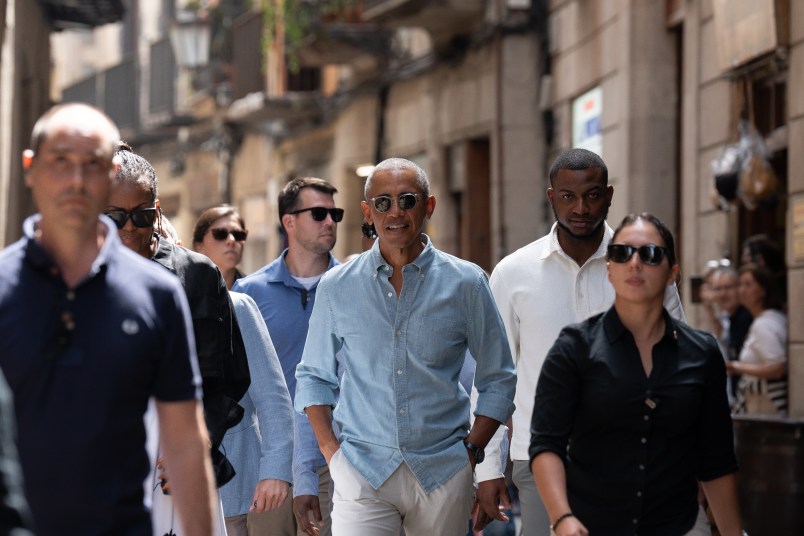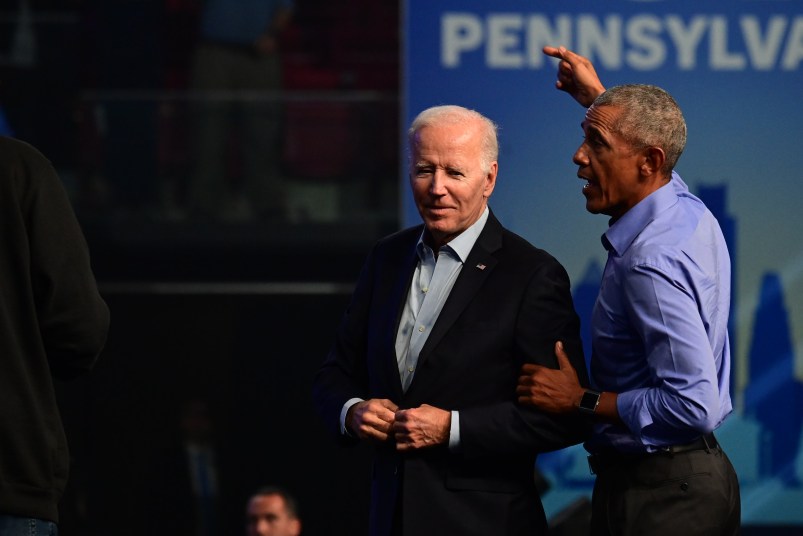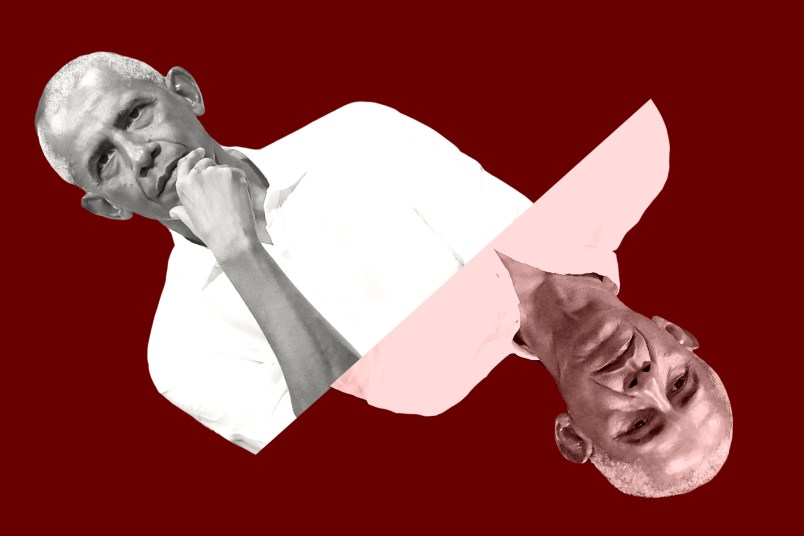Barack Obama is worried about America in 2024.
This is an “all hands on deck moment,” a source close to former President Obama told TPM, describing his thinking. “He’s going to do everything he can to help Democrats win up and down the ballot. And obviously no race is more consequential than President Biden’s reelection.”
Facing a country flirting with authoritarianism, Obama is particularly focused on Democrats’ need to maintain the support of young Americans — a key constituency that at this moment seems to be slipping from the party’s grasp. A spate of worrying recent polls for Democrats show the young voters that helped deliver Biden’s victory in 2020 expressing severe discontent with the president, citing reasons ranging from the war in Gaza, to the cost of living, and climate change. Some even contend that, given the choice between the two 2020 candidates, they will this time vote for Trump.
While he stops short of any express criticism of Biden, who served as his vice president, or other Democrats, Obama is unmistakably of the opinion that they’ve got a lot of political work to do.
“The truth is we don’t just need young people to vote in November,” said the source, who requested anonymity to discuss Obama’s thinking. “We need them to work hard and stand in line and call their friends and throw everything they have at this. And so I think it’s fair to say that young people will be the ball game, as they were in 2020.”
As we report in our new book, The Truce, which will be published on Tuesday, Obama left office stung by Hillary Clinton’s defeat and obsessed with how Democrats could rebuild the unity her long battle with Bernie Sanders had cost the party. He has been especially focused on youth engagement in the years since. Shortly after Democrats took back the House of Representatives in the 2018 midterms, Obama met with the Democrats’ incoming House freshmen at a donor’s mansion in the Kalorama neighborhood of Washington, D.C. to share his thoughts on the party’s direction and the ideal strategy for taking on Trump. While the meeting was previously reported, much of what Obama said behind closed doors was not known.
We obtained Obama’s remarks, and we learned that the former president offered a diagnosis of young voters’ role within the Democratic Party, and the party’s uneven success at keeping them engaged. “When we lose them, it’s because they don’t feel seen and they don’t feel heard,” Obama said of young voters and activists.
“This is not a fifty-fifty country,” Obama explained to the young lawmakers in that 2019 speech. “This is a sixty-forty country, except older folks vote more. And our folks are distracted, discouraged, disempowered, and so we have to work to make them feel included and empowered. But if we do, they’ll respond.”

Obama experienced unprecedented success on this front during his two successful White House bids. Since then, Democrats have struggled to hold together the so-called “Obama coalition” of youth, people of color, and women, which proved instrumental in winning enough votes to surmount the Republican Party’s advantage in the electoral college. In 2016, Clinton turned out fewer young voters than Obama had. Biden improved on that mark in 2020, and, to continue his success, he will need to avoid the kind of second term dip in youth turnout that Obama saw in 2012. That’s particularly important since Republicans have made modest gains with some people of color, chipping away at the Democrats’ advantage on that front.
During his 2019 speech, Obama alluded to the fact that young people tend to support more ambitious, progressive policies and “have a pretty good nose for who’s in it for the right reasons and who’s sincere.” Obama urged the new House Democrats not to be overly cautious and concerned with the “vanity of holding office.”
“Remember why you got here and don’t start thinking that the reason you want to stay here is because you got a pin on, and you got an office, you’re on TV once in a while,” Obama said. “First of all, nobody watches cable TV … ordinary people aren’t reading Politico.”
Still, even as he encouraged boldness, Obama also sounded a note of pragmatism.
“I want to make sure that I am not having all of you … go in front of the Capitol and set yourself on fire,” Obama said. “You guys are also politicians and … you are obligated to think through how you can be effective.”
In the context of this year’s looming presidential election, Obama’s continued focus on activating young people points to some ominous developments for Biden’s reelection campaign. Biden is currently facing widespread and growing protests from progressives horrified by staunch U.S. support for Israel’s war in the Gaza Strip following the October 7th massacre by Hamas. Opposition to the American-backed Israeli campaign, which has left over 20,000 Palestinians dead, is particularly pronounced among young people. Recent polling shows nearly three quarters of adults under 30 disapprove of how Biden has handled the situation. Many progressives opposed to Biden’s foreign policy cite the sort of disempowerment Obama spoke about in his 2019 speech.
Moreover, there are indications in survey data that Biden’s advantage among young voters is fading. Polling toward the end of last year suggested that Biden was in a close race with, or even trailing, Donald Trump for the votes of the younger cohort (which different pollsters define variously as 18-29, 18-34,, etc.), a staggering drop in his standing from 2020, when exit polls indicated Biden won voters in that age group against the same opponent by double-digit margins.
If young voters are the key to Biden’s reelection and his once-sizeable advantage among them is at risk of slipping away, it’s a gut check moment for Democrats, who — with good reason — see this election as a last ditch-battle to save American democracy from an authoritarian takeover led by Trump.
With Trump steamrolling to the Republican nomination after his victory in Iowa, Obama’s view of the campaign — and his potential role in it — has made headlines. Earlier this month, the Washington Post reported that Obama has had “animated” discussions with Biden and the current president’s top aides about the coming race. According to the paper, Obama pointed to the structure of his successful 2012 election operation and encouraged Biden to similarly split top advisers between the White House and campaign headquarters. Our source, while acknowledging that Biden and Obama have discussed the campaign, described the initial reporting about that meeting as both “too negative and too microscopic.”
“They can talk about how 2012 was structured and it is not necessarily a reflection of the current reelection,” the source said.

The source in Obama’s circle dismissed speculation that Obama is unhappy with Biden’s campaign strategy. They repeatedly said Obama will “defer” to Biden about where to deploy in the 2024 race and what messages to focus on.
“I think President Obama believes firmly that this is President Biden’s campaign to run, and we’re not going to second guess it from the outside,” the source said. “We want to be as supportive as we can be, but we’re not in charge of the message and we just defer to their operation and the very smart people they have running it.”
David Axelrod, who was one of Obama’s top strategists, has added to the impression the former president is concerned about Biden’s operation. Axelrod, who is now a senior political commentator on CNN, has made several appearances on the network where he has offered harsh criticism of Biden and his team.
Axelrod, however, is only speaking for himself. “There’s hundreds of thousands of alumni and they all have opinions, and those opinions are great, but that is very different than being seen as speaking for President Obama,” our source said.
Obama’s assessment of the race and his plans for getting involved are particularly notable because, as we report in The Truce, Obama played an essential role in consolidating the Democratic field in the last two presidential races.
Trump launched his first White House bid in 2015, at the end of Obama’s own administration. With Clinton lined up to take him on, Obama pressed Biden — who was also considering throwing his hat in the ring — to make a final decision about whether to enter the race. Biden ultimately decided to stay on the sidelines, and Obama’s push to speed up the process was the source of lingering resentment for some in Biden’s circle.
Clinton ultimately fell to Trump after a divisive primary where she battled progressives led by Sen. Bernie Sanders (I-VT) and a general election where she failed to reconstitute Obama’s coalition. In the hours after Trump’s victory, Biden placed a late night call to Obama, the details of which we report for the first time in The Truce.
“Boss, I told you,” Biden said to Obama, according to a source familiar with the call. “People just don’t like her.”

In 2020, when Biden joined the presidential field, he at first seemed to experience a failure to launch. Sanders and the upstart mayor of South Bend, Indiana, Pete Buttigieg, surged to the head of the crowded Democratic field in the first two states on the primary calendar, Iowa and New Hampshire. Fast forward a couple weeks, and Biden was showing signs of life thanks to a victory in South Carolina. This time, Obama quickly and decisively got behind his former vice president.
As we report in The Truce, Obama encouraged Buttigieg and the other centrist candidates to drop out and get in line behind Biden. Within two weeks of the South Carolina primary, only Sanders and Biden were left in the race.
Obama had laid the groundwork for the maneuver by placing an initial call to the major primary candidates telling them to, as a source described it to us, “give it your best shot.” While Obama offered encouragement, our source said he also warned that a second call would come when he felt it was time to “consolidate at the end.” That final call came after Biden’s South Carolina win. With the nudge from Obama, within two days of Biden’s victory, Buttigieg and two other candidates, Beto O’Rourke and Sen. Amy Klobuchar (D-MN), had dropped out of the race and dramatically endorsed Biden. With the centrist part of the field unifying around Biden, and the Covid-19 pandemic shutting down in-person campaigning, Sanders, too, was relatively quickly out of the race.
Obama’s 2020 efforts on Biden’s behalf didn’t end there. He was also instrumental in creating the so-called party unity commissions that brought Sanders’ staff and allies together with Bidens’ — a move that has had a lasting impact on Biden’s first-term policy agenda. The officials and operatives who served on these committees wrote a party platform that incorporated a number of progressive priorities. They also formed relationships that would carry forward into Congress and the Biden White House. We found that progressive leaders in Congress like Pramila Jayapal forged close ties with Biden’s first chief of staff, Ron Klain, during this period.
The bridges between progressives and Biden may also have helped keep the primary field largely clear for him in 2024. They also brought him allies who will likely join Obama in working on his behalf in this year’s likely rematch with Trump. However, that alliance is showing signs of strain. In a podcast interview with the New Yorker’s David Remnick that aired on Friday, Jayapal expressed frustration with the second half of Biden’s first term and concerns about the prospects for his second campaign. Jayapal cited progressive frustrations with policy matters including housing, immigration, and the war in Gaza. While Jayapal stressed that she was still backing Biden, she warned that his coalition was in danger of fracturing as progressive voters — particularly young people — might stay home on Election Day.
“The Joe Biden of the first two years does not feel like Joe Biden of this last year,” Jayapal said.
Biden has always had his doubters — including, perhaps at times, Obama — and over his lifetime he’s racked up enough setbacks to give those doubts genuine credibility. But during his last campaign and four years in the White House, even amid stumbles, Biden has proved politically savvy and built new relationships with allies, including on the left. As he takes on Trump a second time, Biden has a history of proving the doubters wrong and managing to heal rifts within the party. To defeat Trump, Biden will need to do that all again.
Indeed, even as the source close to Obama acknowledged the former president’s concern about the importance of this election, they stressed his faith in Biden.
“He picked him to be his vice president. He is acutely aware of President Biden’s political strengths, and that’s why he surpassed all expectations in 2020,” the source said of Obama. “Given where a lot of the prognostication is right now, we’ll be in a position to do so again in November.”







Barack Obama is worried about America in 2024
… … … …
So am I!!
No handy cat pic.
I am old, white, uneducated and working class.
Please believe in Barack.
To all you young’uns “dissatisfied” with Biden’s handling of the Gaza mess: You think Trump is going to do a better job?! For Chrissake, wise up! Get your collective asses to the polls in November and vote for Biden. That is all.
I am old, White, educated, working class.
I believe Barack that he is worried about America. I am too. Electing trump could spell the end of the country you and I knew all our lives. I was intensly happy when Obama was elected. I believe electing trump is akin to the reincarnation of Hitler. I can’t say it any more plain than that.
The best thing the Democratic Party has going for it in 2024 is GOP hubris from 2016 on. The GOP’ers have played their hand for all to see. From what I’ve seen so far the Democratic strategy is not to lie or exaggerate about the GOP but tell the plain truth about them: Here is what they said and here they are saying it.
“I got rid of Roe” Trump said. DeSantis’s “Never Back Down” backed down before it encountered the slighted bit of heat. Then kissed DeSantimonius kissed Trump ass. Birtherism is back. all of that just in the past 2 weeks. All a Democratic strategist has to do is watch FOX then plagiarize.